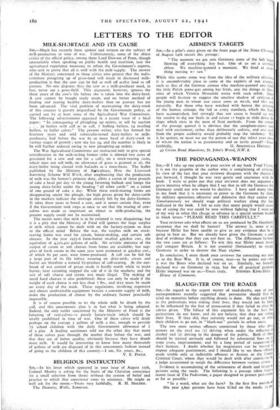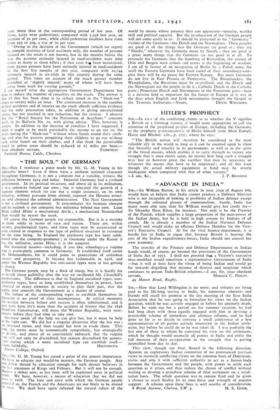SLAUGI-i TER ON THE ROADS
Set,—In regard to the urgent matter of road-deaths, one of your correspondents recently suggested that persuasion should first he tried on motorists before anything drastic is done. He also said that, as the pedestrians were risking their lives, they would not be likely to be influenced by the fear of prosecution if they failed to obey the advice given. The fallacy of this argument lies in the fact that pedestrians do not know, and do not believe, that they are risking their lives. If they did, they certainly would not go out, or allow their children to go out, in " black-out " periods in urban areas.
The two most serious offences committed by those who drive motors on the road are (I) driving when under the influence of alcohol and (2) driving to the danger of the public. Both of these should be treated seriously and followed by substantial fines or, if some cases, imprisonment, and by a long period_ of suspension of their licences. I doubt whether lay magistrates can be trusted to impose adequate punishment, and I should like to see these offence made triable only as indictable offences at Assizes. or the. Central Criminal Court, where they would be dealt with after conviction by a judge accustomed to weigh the difference between various crimes.
Evidence is accumulating of the seriousness of death and iniurY 10 persons using the roads. The following is a passage taken from recent issue of The Pedestrian, a paper designed to protect pedestrians as far as possible: " In a word, what are the. facts? In the first five months d this year 3,691 persons have been killed on the toads, 50 Per
cent. more than in the corresponding period of last year. Of those, 2,035 were pedestrians, compared- with 1,556 last year, an increase of 3o per cent., while child-pedestrian fatalities have risen from 293 to 509, a rise of 7o per cent.
" Owing to the decision of the Government (which we regret) to compile statistics of fatal accidents only, the number of persons injured on the roads is not known, but in the months before the war the persons seriously injured in road-accidents were nine times as many as those killed ; if that ratio h. been maintained, then 33,000 persons have been seriously injured in road-accidents in the first five months of this year, compared with 20,744 seriously injured in air-raids in this country during the same period. This takes no account of the much greater number classified ai ' slightly injured,' many of whom will have been away from work for varying periods."
I ask myself what the appropriate Government Department has done to reduce the number of casualties on the roads. The answer is that all that has been done is to reduce speed in the " black-out " hours to twenty miles an hour. The continued increase in the number of fatal accidents and Of injuries on the roads affords sufficient evidence that the only precaution taken, in addition to giving unsanctioned advice, has not resulted in any reduction, but the reverse. I observe that the " Royal Society for the Prevention of Accidents " contents itself, in its Bulletin No. 12, with giving advice. This, however, is useless. In addition to the increase of penalties I have suggested, I think it ought to be made punishable for anyone to go out on the roads during- the " black-out " without white bands round their cloth- ing, and also for parents permitting their children to go out without such white bands on their clothes, and I also think the permissible speed in urban areas should be reduced to 15 miles per hour.— Your obedient servant, FAIRFIELD. Fairfield House, Caldy, Cheshire.



























 Previous page
Previous page